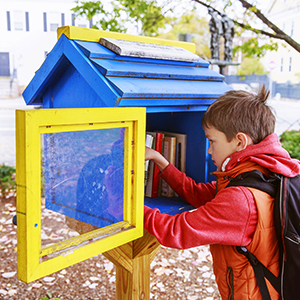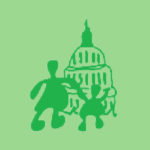What would happen if we were to replace our local treasures, the cherry
blossoms of the nation’s capital, with delightful, whimsical truffula trees in soft, pastel colors as fluffy and delicious as
cotton candy? What if we forgot about the complex interconnected loops of
our metrorail system and dubbed it a snergelly, a friendly snake
with silver, blue and red heads that take us to places we’ve always dreamed
of going?
Surely, Dr. Seuss himself would smile at those metaphors and invite you to
eat green eggs and ham or perhaps speak for the trees and all living
things. Perhaps Todd Bol, the literary connoisseur who created the Little
Free Library (LFL) movement in 2009, would also join in and ask you to Take a Book and Leave a Book.
Neither Dr. Seuss nor Todd Bol are alive today to celebrate with us, but we
honor their spirit and invite you to combine the two literary giants as we
prepare for the upcoming Read Across America event on March 2!
Created by the National Education Association (NEA)
In 1997, a small group of people from the National Education Association
(NEA) worked on a reading task force and came up with an idea to promote
reading and motivate children to read. The group chose March 2 in 1998 as
the inaugural day to celebrate reading. March 2 was significant because
that is the date of Dr. Seuss’ birthday. What better way to inspire
children to love to read than by bridging the act of reading with one of
our beloved children’s book authors – someone who has enchanted readers
with his nonsensical words, playful images and catchy rhyming books?
The NEA established March 2 as “Read Across America” day, hoping to inspire
schools, educators and children alike to spend the day reading. Now in its
21st year, Read Across America has become integrated into many classrooms
and homes, thanks to the innovative spirit of schools and teachers
promoting the event, often pairing it with encouragement for students to
dress up as their favorite literary characters or authors.
Celebrated at public schools, private schools and charter schools
throughout the United States, Read Across America is a steadfast,
recognizable literary event that has successfully impacted our children and
truly set out to do what its organizers intended – to inspire and celebrate
the love of reading.
Though March 2 is the official Read Across America Day, the NEA supports
this program throughout the year by providing schools with resources to
increase the importance of literacy, reading and access to quality reading
materials.
A Literary Movement Begins in 2009
Unrelated to Read Across America, a separate literary movement took place
in a small town in Hudson, Wisconsin. An unassuming man who was in between
jobs in 2009, Todd Bol wanted to honor the memory of his mother, a
librarian, who had just died. Bol built a wooden box that resembled an
old-fashioned schoolhouse. It was small and had doors that opened. He
perched the box on a pole, filled it with books and set it on his front
lawn. His simple idea was to share books with his neighbors as a means of
remembering his mother, who loved books and reading.
To Bol’s amazement, neighbors started gazing upon the wooden box with
genuine admiration. Bol was inspired by their reaction and decided to build
more wooden boxes with the help of a business partner. He handed them out
as gifts. He called them “Little Free Libraries (LFLs).” Bol’s instructions
were to encourage people to Take a Book and Leave a Book. This was
an honor-system setup that was mostly operated by local stewards. The
steward, also the owner of the LFL, was the person in charge of stocking
the shelves of the LFL and ensuring a balanced mix of adult and children’s
titles, taking care to remove any inappropriate materials.
The “recipients” of the LFLs would normally not meet the stewards in
person, but they did happen to meet each other. It is said that the
establishment of the LFLs not only strengthened the love of reading and
celebrated it by encouraging people to take books, but unwittingly started
a positive social experiment, as neighbors began talking to each other more
and building a stronger community in the process.
People adored the LFLs. Bol couldn’t keep them on his shelves and made
more, enlisting help from more people. Eventually, Bol’s actions and the
increased quantity of LFLs turned it into a national movement that gained
local, national and even international media recognition.
In 2012, Bol formalized things by turning his literary idea into a
501(c)(3) nonprofit organization. According to the Little Free Library
website, the organization has “reached 75,000 registered libraries in 85
countries worldwide.” A recent story from an Alexandria, VA. newspaper
detailed nearly 100 LFLs in that area alone. It is estimated that the
entire Washington, D.C. metropolitan area has over 500 LFLs scattered among
its neighborhoods! **
Combining Read Across America with the Little Free Library Movement
There are so many combinations in life that enter our pop culture minds,
like fictional character Laverne DeFazio enjoying milk and Pepsi or Elvis
savoring his peanut butter and banana sandwich. We hope you will enjoy a
new combination that is great for all parents – the little free libraries
and Read Across America!
Why not encourage your children to visit a Little Free Library in your
neighborhood as a simple way of celebrating Read Across America Day on
March 2? Or better yet, we hope you may be inspired to establish a brand
new LFL in a deserving neighborhood that does not already have one. LFLs
are typically found in prosperous neighborhoods of mostly single-family
homes. More LFLs are needed in financially depressed areas, especially
where there are row houses, apartment buildings and mobile homes. Our
metropolitan area has many of these needy communities that would benefit
greatly from having LFLs for their children!
Encourage your children to dress up as their favorite literary character
and celebrate Read Across America day yearround. Perhaps host a
neighborhood social gathering or a birthday party using these characters.
Parents can never get enough of Harry Potter and Mrs. Frizzle themes!
For more information about:
- The history of Read Across America day, please
visit:
nea.org/grants/read-across-background.html. -
The Little Free Library organization, please visit:
littlefreelibrary.org.
The Little Free Library organization offers a tool to help people find
registered LFLs by various criteria. It is important to note that only
about 50 percent of LFLs are registered, and therefore appear on the LFL
website. About 50 percent are unregistered and may be found only by driving
around.
See: littlefreelibrary.org/ourmap/



